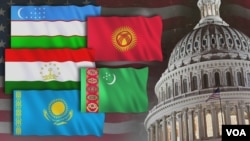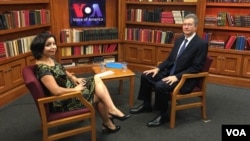The top U.S. diplomat for Central Asia says the region's relative stability means it often does not get much attention, but that a top priority when the next U.S. president takes office will be to explain the area's importance to that new administration.
Deputy Assistant Secretary of State Daniel Rosenblum said he is confident that the group of countries that includes Kazakhstan, Kyrgyzstan, Tajikistan, Turkmenistan and Uzbekistan will be seen as a good investment of State Department resources.
“We want stability. We want these countries to be able to be secure and not become havens for terrorist activity," Rosenblum told VOA's Uzbek Service. "We saw what happened in Afghanistan in the 1990s and what that resulted in in terms of a threat to our national security and we don’t want the same to play out in Central Asia.”
In addition to security, the U.S. is also prioritizing economic success in the region including cross-border trade and infrastructure improvements, as well as efforts to promote good governance with institutions that are accountable to citizens.
“The good governance area, that basket, has been maybe the most challenging over the years of the three, and you can measure progress in a variety of ways, but it’s one that we certainly haven’t made the progress that we would have – the countries in the region haven’t made the progress that we would have liked to see in that third area.”
‘Common goals’
Rosenblum said the "very frank and direct talks" between U.S. officials and those in Central Asia cover a range of human rights issues, including religious freedom, in terms of the broad struggle between promoting security and transparent governments. He said the key is to have a balance and that sometimes those involved in the discussions have a different perspective on how best to do achieve that.
“We don’t always see eye to eye on what the balance should be," he said. "We continue to believe that restricting peaceful religious practice and belief in the long run – restricting it in ways that lead people to look for alternatives perhaps or seek more radical solutions is counterproductive, that is it will lead in the end to the defeat of the other goal of security.”
The five nations are 25 years removed from being part of the Soviet Union and, given their proximity, remain of interest to Russia and also neighboring China.
Rosenblum said the fact that three powers are involved in the region does not mean it is a contest with a winner and a loser.
“We think that we have a lot of common goals with other countries in the region, including Russia and China," he said. "The stability goal I talked about, the economic connectedness goal, the idea that these countries should be more prosperous and should succeed, I think these are shared goals, and our belief is that our relationship and our activity in the region is not coming at the expense of anyone else."
VOA Uzbek Service reporter Navbahor Imamova contributed to this report.





